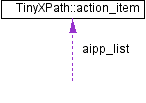
#include <action_store.h>
Collaboration diagram for TinyXPath::action_store:

Public Member Functions | |
| action_store () | |
| constructor | |
| ~action_store () | |
| destructor | |
| void | v_add (int i_1, int i_2, int i_3, const char *cp_string) |
| add an element on the placeholder, given its details | |
| int | i_get_size () |
| Get the current nb of stored elements. | |
| void | v_get (int i_position, int &i_1, int &i_2, int &i_3, TIXML_STRING &S_out) |
| Get one element from the placeholder. | |
| int | i_get_position () |
| Get the current position. See i_position. | |
| void | v_set_position (int i_where) |
| Set the position to an arbitrary value. See i_position. | |
| void | v_dec_position () |
| Decrement the position. See i_position. | |
Protected Attributes | |
| int | i_size |
| Used number of elements. | |
| int | i_position |
| This value is informative and is not related to the nb of elements in the placeholder. | |
| int | i_alloc |
| Nb of allocated elements. | |
| action_item ** | aipp_list |
| Pointers to the allocated elements. | |
Not a stack per se, only a placeholder
It's able to store quadruplets (3 integers and a string)
It allocates them by set of 100
|
|
constructor
|
|
|
destructor
|
|
|
Get the current position. See i_position.
|
|
|
Get the current nb of stored elements.
|
|
||||||||||||||||||||
|
add an element on the placeholder, given its details
|
|
|
Decrement the position. See i_position.
|
|
||||||||||||||||||||||||
|
Get one element from the placeholder.
|
|
|
Set the position to an arbitrary value. See i_position.
|
|
|
Pointers to the allocated elements.
|
|
|
Nb of allocated elements.
|
|
|
This value is informative and is not related to the nb of elements in the placeholder.
|
|
|
Used number of elements.
|
